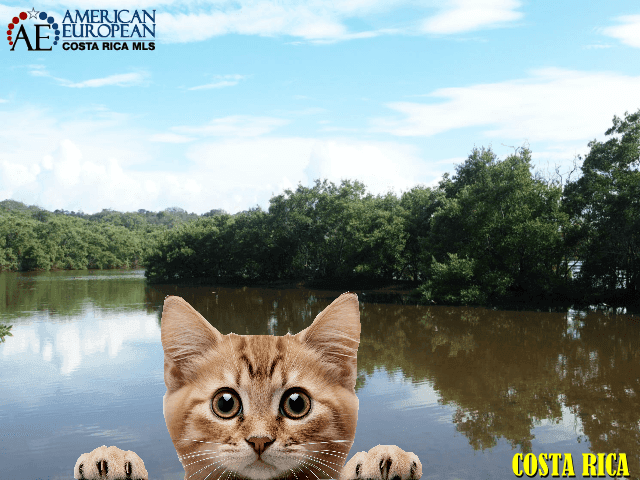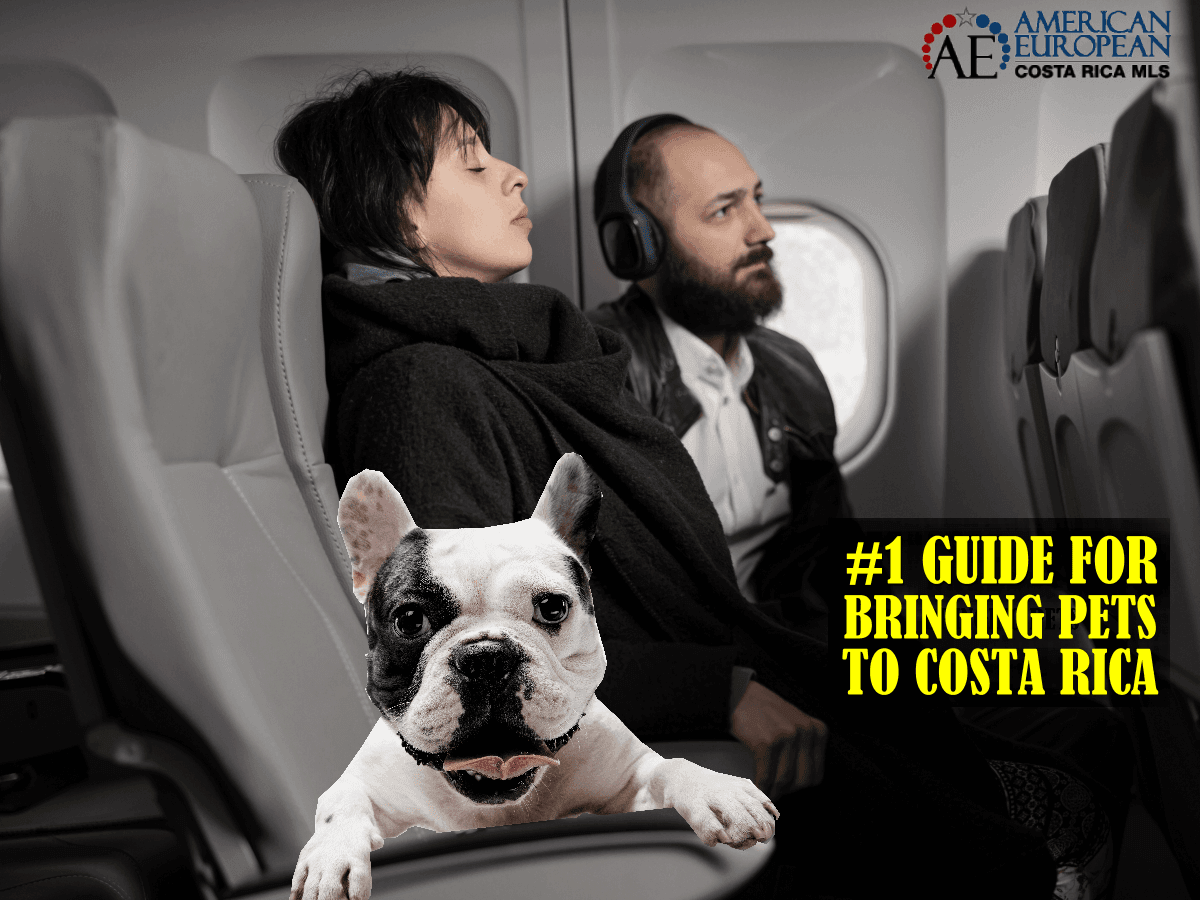Estimated Reading Time: 7 Minutes
Are you moving to Costa Rica and wondering how to bring your pets to Costa Rica? They’re family, right? If you have a dog, a cat, a horse, or a parakeet, you will want to bring them with you when you move to Costa Rica. Of course, once you have decided where to purchase Costa Rica real estate.
If you research online about the requirements for traveling with your pets to Costa Rica and how you can travel with them, you’ll find different ways and different opinions about how to and how much. Therefore, you need to do your due diligence, just like when searching for a home or learning where to live in Costa Rica.
Are you looking to rent and don’t know how to handle a rental with your pet? Check out this pet-friendly blog.
I want to give you the correct information about bringing your pets and how to travel with your pets to Costa Rica. Information that doesn’t always change and links to the right places. Here is a guide to how to get the correct information to bring your pets to Costa Rica.

What are the requirements to bring your pets to Costa Rica
The requirements for bringing your pets might change at any time. To ship a pet, it must be older than eight weeks. Your dog or cat must be accompanied by a health certificate issued by a licensed veterinarian and endorsed by a U.S. Department of Agriculture (USDA), Animal and Plant Health Inspection Service (APHIS), or Veterinary Services (VS) veterinarian. The certificate is only valid for ten days and should not expire before the pet reaches Costa Rica.
Vaccination
To enter Costa Rica the animal must have an up-to-date vaccination for rabies. The rabies vaccine must be given at least 30 days before the day of departure and be good for at least one year. (Costa Rica does not recognize the three-year rabies vaccination.) Some other vaccinations may be required depending on the country of origin. If the pet travels from the USA, the veterinarian must be USDA certified; if from Canada, they must be accredited by the CFIA. Certificates of the vaccination(s) must be prepared by the veterinarian, who completes the standard Health Certificate; in the US this is USDA APHIS Form 7001.
Other possible vaccinations which are available, but are not required for entry into Costa Rica, are:
- Dogs: distemper, hepatitis, leptospirosis, parainfluenza, parvovirus (DHLPP), and bordetella.
- Cats: feline viral rhinotracheitis, calicivirus, and panleukopenia (FVRCP).
How can you fly your pet to Costa Rica?
Depending on your pet’s size and weight, you can fly it to Costa Rica as carry-on, checked baggage, or cargo. You must check with each airline regarding requirements and costs.
Your pet carrier must meet the airline’s safety standards, check on that too before you purchase one. Most airlines adhere to day-of-travel temperature restrictions.
Airlines that transport pets have very specific requirements for transporting them inside the airline cabin or as checked baggage or cargo. Check with your carrier to determine their regulations and charges.
For the safety of the animals being transported, they may not be tranquilized, drugged, or muzzled.
If you bring your pets from the United States to our country, check on the US State Department’s recommendations. The CDC also has some great recommendations.
TSA Screening
Yes, you should know how to take your pet through the security checkpoint and how to do a little prep work ahead of time.
At the pet’s arrival
When a pet is traveling in the aircraft cabin with its owner, Costa Rica veterinary officials should be notified so they will be available to inspect the pet upon arrival of the flight. When examined at the entry airport, all domestic dogs and cats must be free of evidence of disease communicable to humans. If the animal is not in apparent good health, further examination by a licensed veterinarian may be required at the pet owner’s expense.
The owner will also need a personal letter stating the pet’s market value or a document that proves its value, such as an invoice. You may provide this information on the Veterinary Certificate.
All pets must be examined by a licensed Costa Rica veterinarian within 14 days of entry, who will complete the Costa Rica Veterinary Certificate. An alternate copy translated into Spanish is also required.
If the pet travels as checked baggage or cargo and is not on the same flight as the owner, an import permit is required, and you must use a licensed import company to clear customs. For more information on pet importers, do a web search using “animal shipping to Costa Rica.”
To make the customs process as easy as possible, the import company needs a copy of the passport of the person importing the animal, a copy of the passport of the person receiving the animal, and that person’s phone number and address in Costa Rica. They also need a copy of the animal’s valid health certificate and vaccinations and information on the animal’s flight reservation.
Customs Office
The Costa Rica airport customs office is only open during normal business hours, Monday through Friday. Pets arriving on weekends cannot be retrieved until the following Monday. If your flight arrives at night, you must wait until the next day. The customs clearing process can take several hours, so plan accordingly.
Check the up-to-date information for each airline
Perro Air
Chuck and Sarah Holcomb run PerroAir. It’s much more expensive, but if you love your pets and can afford it, Yes, they’re more costly than a regular airline, but you’ll see it’s worth it.
They fly from:
- Houston – Liberia and vice versa
- Fort Lauderdale – Liberia and vice versa
American Airlines
Pets traveling in the cabin of an AA flight to Costa Rica require a reservation to ensure no more than seven pets are booked on any single flight. According to the American Veterinary Medical Association, cats and dogs should not be given sedatives or tranquilizers before flying. See more information on bringing your pets on the AA traveling.

Delta Airlines
Review the health, kennel, and weather requirements on the Delta Airlines website to help keep your pets safe and secure during travel. Due to seasonal weather conditions, Delta Airlines does not accept pets as checked baggage from May 15 through September 15. You can, however, bring your pets as cargo with the Delta Pet First program. Find more information on traveling with your pets by Delta Airlines.
United Airlines
If you plan to fly with your pet, they must be a cat or dog and be in the cabin with you (if there’s space available).
You can bring up to 2 pets per person. However, if you’re bringing 2 pets, you must buy 2 seats on your flight. Your second seat must be next to your assigned seat so you can care for both pets.
Some destinations don’t let you bring a pet with you. So, be sure to double-check with United Airlines before you book your flight.
Martinair – KLM – Airfrance from Europe
The Air France—KLM Cargo & Martinair Cargo Animal Hotel at Amsterdam Airport Schiphol is the world’s largest and most modern facility, designed especially for animals in transit. It is the only one in the world operated by an airline, meaning you can trust your animals to them, knowing they will always remain in their hands.
Other pet travel organizations
World Pet Travel
I recommend using Angela Passman of World Pet Travel if you don’t have the time to do all the research. Angela has ensured the pets of many of my clients have arrived happy and safely in Costa Rica. And she can do the unusual, not only a cat or a dog.
It will cost you more, but it is worth investing in your family members’ well-being and preparing them for their new country.
International Pet and Animal Transportation Association IPATA
IPATA recommends using a professional to assist in relocating your family’s VIP (Very Important Pet). Visit their website to learn how to facilitate travel with your pets to Costa Rica.
When bringing your pets to the tropics, be aware of many issues. Find a vet as soon as you arrive. Your American European Real Estate affiliate agent can recommend a local veterinarian.
Contact us if you want to purchase or rent a pet-friendly property in Costa Rica.
Image by Vaynakh on Freepik, Image by freepik and Image by master1305 on Freepik



















